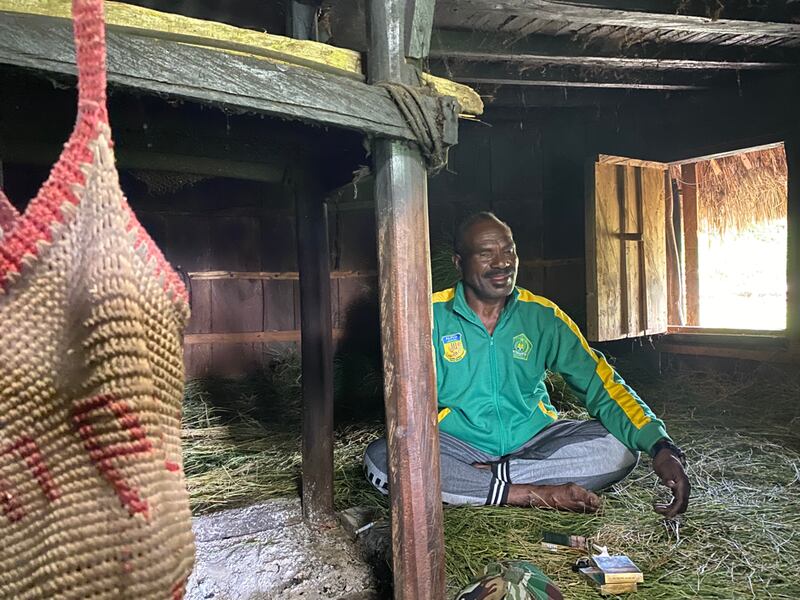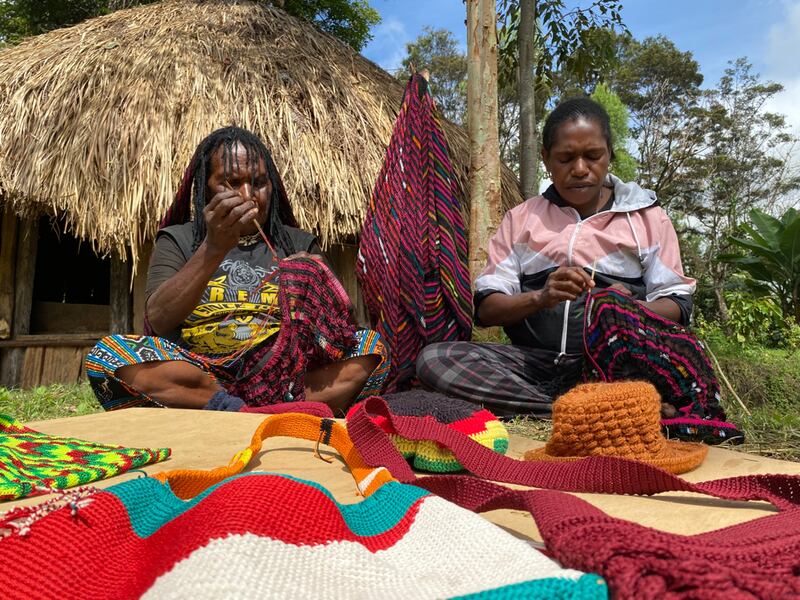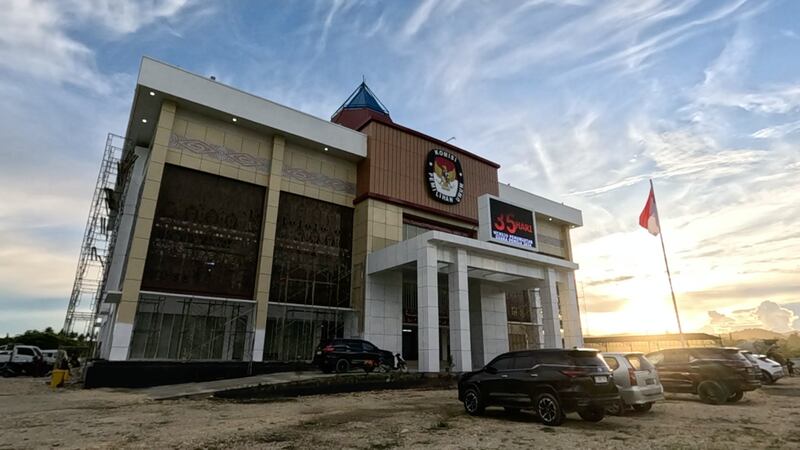UPDATED at 8:05 p.m. ET on 2024-02-09
Inside a thatched wooden house on a hillside overlooking a valley of fields and forest, Sadiq Asso gathered his clan members to discuss a matter of national importance: Indonesia’s upcoming general election.
Sadiq, the tribal chief of the Assolipele clan in Jayawijaya, a regency in the Papua region, was preparing to lead his community of 2,000 people in voting on Feb. 14, when Indonesians will choose the successor to President Joko “Jokowi” Widodo and new members of Parliament.
But unlike most of his fellow citizens, who will cast their ballots individually, Sadiq will use a traditional voting model called the noken system to vote on behalf of his community, based on prior consensus.
“We’ve agreed to use the noken system to preserve our culture,” said Sadiq, as women of his clan sat nearby weaving the multifunctional bag made from bark after which the voting method is named.
Papua’s six provinces, which are home to 4.4 million people, are predominantly inhabited by Melanesians, who are culturally and ethnically distinct from the rest of Indonesia. In remote areas, particularly where the mountainous terrain and dense jungles make access difficult, voting is a collective decision overseen by tribal chiefs.
“The noken system aims to accommodate people who are considered illiterate and overcome geographical problems,” Theodorus Kossay, the head of the General Election Commission for Highland Papua province, of which Jayawijaya is part, told BenarNews.
Under the noken system, community members typically entrust their voting rights to a “big man,” who elects the ticket of the candidate on their behalf. The ballot is then delivered in a noken to election officials.
In other villages, after deliberation with a leader, the number of votes for each candidate is divided up by community consensus. The ballots are cast into a noken bag hanging at a polling booth.

The noken system was introduced in Papua during Indonesia's first direct election in 2004, but some election officials believe its use dates back to 1969, when the United Nations oversaw a contentious referendum that formalized Indonesia’s control over the western half of New Guinea island.
The referendum, in which a little over 1,000 handpicked Papuans were allowed to vote, is widely considered a sham and continues to fuel resentment of Indonesian rule in the region.
Poorly armed Papuan fighters – collectively known as the West Papua National Liberation Army – have battled Indonesia since the early 1960s, when it took control of the western half of New Guinea island from the Dutch. A separate nonviolent independence movement is regarded as treasonous by Indonesian authorities who have imprisoned key leaders.
Today, Papua is the most heavily militarized part of Indonesia and one of its poorest regions.
Trust and transparency
Mistrust of Indonesia’s formal voting system explains why some Papuans prefer the noken model.
“The one using the ballot box is not transparent,” said Sadiq. “With the noken system everything is out in the open. After the voting is done it is placed on the table openly.”
Sisilia Asso, 28, who belongs to the same clan as Sadiq, said she respected the tradition and collective approach to voting.
“We prefer the noken system because it is done according to the consensus we have come to,” said Sisilia, who holds a bachelor’s degree in accounting.
However, the model is not without its critics. Some argue it is undemocratic because it does not give citizens the freedom to choose without the influence of the tribal chiefs. Others say it is susceptible to manipulation and women are often sidelined in communal decision making.

Irsan Yelipele, 30, a youth leader in the remote Walesi district in Highland Papua, said he believed direct voting was fairer and more transparent.
“I prefer one man, one vote because the noken system is prone to fraud, which can include transferring votes from our chosen candidate to another,” Irsan said.
Loina Lokobal, 20, a student in the highland’s town of Wamena, expressed similar concern.
“I heard about such cases from my parents. So, for the presidential election I will vote by myself,” she said.
‘We will resist’
Electoral authorities in Papua have tried to balance the opposing views by allowing the noken system to be used in some remote and mountainous areas, while encouraging direct voting in cities and towns.
Officials have also implemented measures to ensure transparency and accountability, such as punching a hole in the noken to indicate that a vote has been cast, and summoning the tribal chiefs and political parties to agree on rules.
But the noken’s use in elections could soon be over. The Indonesian Election Supervisory Agency has called for it to be abolished because it violates democratic principles. And under the central government’s 2022-41 development plan for Papua, the system is being reviewed.
“We aim to reach an agreement on whether the noken system will be in place in 2041 or if there will be modifications or a middle ground,” Velix Wanggai, the acting governor of Highland Papua province, told BenarNews.

Phasing out the noken system would take time because of its cultural significance in Papua, said Naftali Paweka, an electoral commission official in Highland Papua.
Sadiq, the tribal chief from Jayawijaya, said attempts to get rid of it would also face resistance.
“As tribal leaders, we will surely resist,” he said. “Who dares to let our culture disappear?
“You were born in the noken, you fill [the ballot] in the noken, and you return to the noken.”
An earlier version of this story incorrectly used a female pronoun for Irsan Yelipele, a man.
